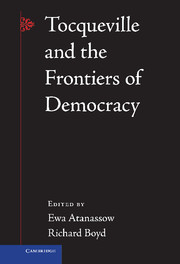Book contents
- Frontmatter
- Contents
- List of Contributors
- Short Title Abbreviations of Tocqueville's Major Works
- Acknowledgments
- Introduction: Tocqueville and the Frontiers of Democracy
- Part One The Meaning of Democracy and the Democratic Revolution
- Part Two Democratization in a Non-Western Context
- Part Three Challenges of Globalization: Democracy, Markets, and Nationhood
- Part Four Democracy, Imperialism, and Foreign Policy
- 10 The Surprising M. Tocqueville: Necessity, Foreign Policy, and Civic Virtue
- 11 Democracy and Domination: Empire, Slavery, and Democratic Corruption in Tocqueville's Thought
- 12 Tocqueville and the Napoleonic Legend
- Part Five Democracy's Old and New Frontiers
- Epilogue: New Frontiers, Old Dilemmas
- Bibliography of Works Cited
- Index
- References
10 - The Surprising M. Tocqueville: Necessity, Foreign Policy, and Civic Virtue
Published online by Cambridge University Press: 05 April 2013
- Frontmatter
- Contents
- List of Contributors
- Short Title Abbreviations of Tocqueville's Major Works
- Acknowledgments
- Introduction: Tocqueville and the Frontiers of Democracy
- Part One The Meaning of Democracy and the Democratic Revolution
- Part Two Democratization in a Non-Western Context
- Part Three Challenges of Globalization: Democracy, Markets, and Nationhood
- Part Four Democracy, Imperialism, and Foreign Policy
- 10 The Surprising M. Tocqueville: Necessity, Foreign Policy, and Civic Virtue
- 11 Democracy and Domination: Empire, Slavery, and Democratic Corruption in Tocqueville's Thought
- 12 Tocqueville and the Napoleonic Legend
- Part Five Democracy's Old and New Frontiers
- Epilogue: New Frontiers, Old Dilemmas
- Bibliography of Works Cited
- Index
- References
Summary
Antecedent facts, the nature of institutions, the cast of minds and the state of morals are the materials of which are composed those impromptus which astonish and alarm us.
– Alexis de TocquevilleTo anyone wishing to explore the perennial debate over the issue of whether the United States can more effectively promote the cause of liberty around the world by conducting itself as the exemplar of liberty at home or by exerting itself as the vindicator of liberty abroad, an examination of the practical steps to advance liberty is as inescapable a starting point as is an understanding of the theoretical underpinnings of liberty. No one has expounded on the interplay between theory and practice more fully and more lucidly than Alexis de Tocqueville. Reflecting on his North American travels in 1830 and on the mass of documentation that he gathered on American thinking and political practice and on his observation of the fate of liberty in France and elsewhere in Europe, he made himself perhaps the greatest advocate of freedom and the most acute analyst of threats to freedom that the modern world has seen. Yet in his identification of the public policies best calculated to preserve freedom by encouraging the habits of mind that would support freedom, he returns to the realm of necessity. The circumstances in which a people live, it seems, significantly constrain the means by which it can maintain its liberty and the degree to which it can promote the liberty of others; the choice between the roles of exemplar and vindicator is narrowed by given conditions over which that people and its leaders have little control.
The great advocate for human beings’ control over their own destiny and the great scourge of all varieties of determinism, Tocqueville contends that the truths of liberty are valid at all times and places. Yet the givens of human existence, and in particular the changing realities of international politics, are facts to which he advises submission. That we have inadequately appreciated the variety of counsel that Tocqueville gives to leaders facing differing but equally unchallengeable circumstances has perhaps been a result of our neglect of Tocqueville the political actor in France as opposed to Tocqueville the author of Democracy in America. There is more than one Tocquevillean path to liberty, and some of the alternate routes lead over unexpected terrain. Let us unfold the complete map.
- Type
- Chapter
- Information
- Tocqueville and the Frontiers of Democracy , pp. 223 - 242Publisher: Cambridge University PressPrint publication year: 2013



